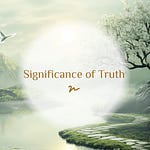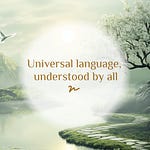🎧 Please listen to the audio using the player above.☝️
In the third episode of the Nectar of Peace podcast, we will delve into the concept of Dharma, or righteousness. Dharma, as the essence of the right way of living, is a key element on the path to peace, contentment, and freedom. This time, we will be guided into living according to Dharma by three great teachers: the avatar Sathya Sai Baba, the great sage Jiddu Krishnamurti, and the already familiar teacher Novo.
What you’ll hear in this episode:
The meaning of the word Dharma
Living without creating consequences
Examples of the right way of living
The importance of patience
The importance of religiosity and behavior
Prayer as part of responsibility
My name is Mitja Žibert, and I’ll be your host on this podcast, which serves as an invitation to personal and spiritual growth.
Sources:
Novo: Lectures and Q&A archive
Satya Sai Baba: Book Sai Baba Speaks to the West
Jiddu Krishnamurti: Colombo 5th Public Talk 27th January 1957
If you found this episode interesting and helpful, I invite you to share the show with others - perhaps you’ll inspire them to live according to Dharma.
Episode transcription
Welcome to the third episode of the Nectar of Peace Podcast, which is dedicated to sharing universal truths and wisdom taught by humanity’s greatest teachers and sages.
My name is Mitja Žibert, and I’ll be joining you in discovering these invaluable teachings that, if we choose to follow them, lead us to a life filled with the nectar of peace - which is what we all seek and need. So, let’s see where we can discover and embrace it today.
In the first episode, we touched on three practical steps toward embracing the right way of living. Today however, we will focus on the very essence that holistically encompasses this way of life - an essence of which those initial three steps were only a part. Namely, we will explore the laws of life and righteousness.
And regardless of whether you consider yourself an atheist or a believer, regardless of which religion or spiritual tradition you may follow, and regardless of where in the world you live or which culture you are a part of, these laws apply to everyone and to everything that abides in the material existence. Therefore, we can also refer to them as universal or cosmic laws, or simply as Dharma.
The word Dharma, just like words Shanti and Amrita, originates from an ancient language Sanskrit. The root of the word itself means to hold or to support, from which follows something that is established or firm. Thus, the word Dharma is translated as duty, cosmic law, or righteousness.
And to lead us into the life of Dharma, we will today draw upon the teachings of three great teachers: namely we will be joined by Avatar Satya Sai Baba, the great sage Jiddu Krishnamurti, and of course, now already familiar teacher Novo.
So let's begin with Novo, who introduces us to the world of Dharma in the following way:
Teachings
“At first everything was made so that it is easy … and everything was easy. To everyone, consciousness was easy, understanding was easy, insights were easy … everything was easy. Original life was easy both for awareness and understanding, as well as for living based purely through insights … and such a way of living is called Dharma.
The word Dharma also means divine laws or a collection of laws that do not cause problems if one lives according to them. Therefore, living in such a way, problems are not created, everything is easy, joyful, and pleasant.
Thus, the word Dharma can also be understood as divine life, righteous life, or life—or existence—without wrongdoing.
Disregarding consciousness, understanding, and insights is called wrongdoing—or creating consequences.
This means that living according to Dharma, consequences are not created … and conversely, not living according to Dharma, consequences are created.
It is somewhat like when a person walks a path that is filthy or clean … Dharma means that if you do not wish to become dirty, go along a clean path … in other words if you go along a clean path, you don’t take responsibility for anything, you bear no consequences. So, you make sure to walk the clean path and are thereby without consequences.
Meaning, Dharma protects you, always gives one, because the other (namely consequences) is not within Dharma, and therefore it is also presented as the first or primary teaching, and is partially, in some instances even holistically, conveyed in spiritual teachings—such as, for example, in the Ten Commandments or in yogic doctrines. But Dharma is most prominently reflected in folk sayings or proverbs.
Some examples are, for instance: do not steal, do not lie, do not interfere with the will of another, do not desire and do not take what belongs to another, turn your attention inward, live in love, do not lean on others, do not expect from others, do not impose your will on others, be content with what you have… these are examples of general laws of Dharma.
But there also exist more complex laws. And in order to reach these more complex laws, a person must know all the things one must not do in life—or what is not for humans. And by living according to the basic, simpler insights, a person slowly comes to ever deeper insights, until finally they realize what God truly means. Until that moment, one might think they know or understand what God is, but in truth, they do not know. They only comfort themselves and unconsciously lean on the idea of God.”
Let me add here that the insights which Novo speaks of are an extraordinary human ability and a window into the deepest mysteries of our existence. However, this ability is accessible to a person in direct proportion to how much the individual lives in accordance with the laws of Dharma. So, the more we dedicate our life to Dharma, the clearer and deeper the insights into life and truth become. And insights are what reveal things as they truly are. When a person recognizes things as they truly are, they cannot do wrong — or there is no longer a need for wrongdoing.
And with this, any doubt about whether or when one is doing wrong is also removed … or as Novo explains:
“When you ask yourselves how to recognize causality or wrongdoing, the answer is that if you live according to Dharma, you have total insight in every situation. And with that, such questions are no longer necessary, because in every situation, with total insight, you also have a complete answer on how you must act — so there is no need for knowledge or thinking about consequences. These questions only arise when we lack insights.
What is meant by insight is seeing, perceiving, and recognizing the situation as it truly is. So, when you recognize the situation as it truly is, you are in Dharma. When you live in Dharma and move in your own rhythm, you finish as you begin, without getting tired … the beginning is the same as the end.
But when you start with an action that comes from your own will — for example, you want to speed up … the faster you go, the more the need arises to stop or slow down. The same applies if you slow down too much. That again brings effort, specifically, the effort to slow down … it may be easy at the beginning, but the more or longer you are slowing down, the more difficult it becomes. For example, you can lie down and fill yourself with energy, but then you must get up, you must move again.
So Dharma — or in other words, spontaneity — means acting within the boundaries of what is allowed and light, and at the same time does not trigger, as a consequence, a change in mood. If the mood changes, it means one is not acting according to Dharma.”
At this point, where spontaneity or the importance of acting in one’s own, natural rhythm was mentioned, I will add the words with which Satya Sai Baba touched upon Dharma. He said the following:
“When you are in harmony, your actions are also harmonious, or in other words, you are in Dharma, you are righteous. You act or you stop when it is appropriate. And with that, your actions will be successful.
Everything has its time. There comes a time when you must be active, and a time when you must rest. A time comes when you must go, and a time when you must stay. The same goes for learning and working, speaking and silence, eating and fasting.
True balance is Dharma or righteousness, and this is the essence of life.
Everything has its time. You cannot smell a green bud and expect it to be fragrant. You cannot milk a calf and expect to bring home milk. You cannot expect a puppy to already be a guard dog.
Everything has its time. Everything needs its own time for its own development.
If you act outside of this time, you will either fail or have to invest much more energy than if you had waited for the right moment. That is why acting in Dharma or righteousness means acting at the right time. Patience and the ability to wait are the salt of life.
Always keep in mind that patience must be the foundation of your actions. Patience represents the greater part of success in life. Patience and the recognition of when and where to act are the foundations of Dharma or righteousness.”
Thus, Sai Baba has beautifully highlighted another of the laws—or essential aspects—of Dharma, and that is patience.
And indeed, patience is one of the key qualities that can protect us from wrongdoing and thereby from negative consequences. While wrongdoing itself and causality are not the main focus of today’s episode, you may have already noticed—and as it will become even more evident further on— they are difficult to avoid mentioning when speaking about Dharma, even though Dharma in itself does not contain them.
In this way, Novo on the one hand strictly separates Dharma from wrongdoing, yet on the other hand reconnects it to causality—through destiny. He says the following:
“The aforementioned knowledge or rules of Dharma are thus given, and regardless of the extent to which people study and verify them, they represent something called an axiom in science, meaning a permanent law that operates but cannot be proven.
These rules originate from or represent Dharma, and not wrongdoing, although someone could describe them as such, in the sense of ‘if you steal, I will punish you.’ That is indeed true—you will be punished, and this truly belongs in the realm of wrongdoing or causality. Because, causality means that to every action inevitably follows a reaction, just as night and day are connected… inevitably after a night comes a day. So action and reaction are connected — or in other words, this is causality, causation, or consequentiality.
In causality, there is not the slightest action that is not followed by continuation… so the action itself does not end with that action alone, but immediately after the action follows obligation and dependence, at least to the extent of the action itself.
But in Dharma, this is not so… in Dharma there is only one… causality has at least two sides, Dharma has only one.”
And as I already mentioned earlier, causality leads back to Dharma, because it is closely connected to our destiny—which itself is an essential part of causality. The concept of “destiny” itself will be addressed separately in one of the other episodes, but what is important for today is that Dharma is part of destiny, and according to Novo’s words, in the following way:
“If destiny is given to us to be served or settled, Dharma, within that, shows us how to correct what we have up to that point done wrong. For example, if someone was stealing in the past, Dharma tells them ‘don’t steal.’ So Dharma shows us how to not create new consequences.
And destiny is given to us with the purpose to be depleted, not to be multiplied.
Destiny, as the sum of our good and bad deeds from the past, together forms Dharma, which says the following: Where you did good, continue. Where you did bad, stop—there start doing the opposite. And with this, all problems as the consequence of our own past work positively, they teach us.”
So, as we can see, it is by no means a coincidence that Dharma in general is considered a present, or a divine gift, for it guides us on the path of righteousness—or toward the right way of living. This wonderful gift of life shows us at every step how not to engage in wrongdoing—or if and where we still do that, how to stop doing so. And what could be a more beautiful gift for life than that?
And since God was already mentioned, I should add that when speaking about Dharma, we cannot ignore the fact that Dharma is also synonymous with what represents a true spiritual life. And this is something that, if people lived according to Dharma, religiousness would also represent.
And it is from this perspective, that Dharma is approached by the great Jiddu Krishnamurti, who in one of his talks connected righteousness, or Dharma, with faith or religiousness and with truthful action, which he simply calls behavior.
About Dharma or righteousness he said the following:
“To inquire into the whole question of what is true religion, one must first understand what behaviour is. The foundation of right inquiry is surely behaviour, which is righteousness; and righteousness is not merely the cultivation of virtue. A man who cultivates virtue ceases to be virtuous; a man who practices humility is no longer humble.
Righteousness or behaviour is not something to be gained, to be arrived at, but it must be understood from moment to moment in the actuality of daily living. That is why it is important to have self-knowledge, to know how you think, how you feel, how you act, how you respond to another. All that indicates the manner of your approach to life, and therein lies the foundation of righteousness, not in some Utopia, ideal or organized belief. The actual foundation must be laid in our daily living.
So a man who would inquire into what is true religion must lay the foundation of righteousness by being without envy, without ambition, without the greed for power. This is an actual possibility, I am not being idealistic. Ideals and actuality are incompatible.
That is why it is important to lay the foundation of righteousness, which is to step out of the present society. Stepping out of society does not mean becoming a hermit, a monk, or a sannyasi, but being without greed, without envy, without violence, without the desire for position and power.
To understand righteousness it is necessary to step out of the pattern of society. By society I do not mean the organized means of communication, of supplying food, clothing, shelter, and so on, but the whole psychological or moral issue which is involved in society. A person who seeks to inquire into what is true religion obviously cannot belong to a society which accepts greed, envy, the pursuit of personal ambition, the search for power, fame, and all the rest of it. To belong to a society based on cruelty and the pursuits of self-interest, and still be religious, is obviously impossible.
So the man who would be religious cannot belong to any organized belief, which only conditions the mind, but must be concerned with behaviour, which is righteousness - his own behaviour, not that of others. Most of us are so eager to reform others and so little concerned with the transformation of ourselves. What matters is not how others behave, your friend, your wife, or your husband, but how you behave.”
In such an exceptionally direct and grounded way, Krishnamurti reminds us of the importance of self-knowledge, which through careful observation plainly shows where we have strayed from living according to Dharma and how to return to that path. We will definitely meet Krishnamurti again, as for more than six decades he served humanity in his unique way and, in doing so, left for us a vast collection of invaluable knowledge—especially about the importance of living according to Dharma.
And with Krishnamurti highlighting the important connection between Dharma and our behavior — and thus the problem of the lack of foundations of righteousness in society — I would like to add that people like to believe that we mostly live decently, justly, honorably, and that we don’t do wrong … that we generally live, for example, according to the Ten Commandments. But in doing so, we often resort to self-justification, saying things like, "Well, I'm not that bad, I live honestly, I don't sin that much…” and so on. This mindset is very present and widespread.
At the same time, if we are sincere enough, we can also observe in ourselves how the problem of society that Krishnamurti speaks of is also present within us. With just a bit of attention and awareness, we can quickly notice — if not those big ones, then at least the small lies, gossiping, envy, competitiveness, manipulation, control, demanding attention, dwelling on the past, worrying about the future, pseudo-altruism, and so on… and all of this is, in more or less subtle forms, present in our daily behavior.
But often, we don't want to see this as wrongdoing; we don't view it as necessarily something bad. After all, this is just how people are — and that's completely normal, right?
However, this kind of mindset or self-justification is extremely dangerous and harmful. These denials become such subtle habits of the mind that, over time, we no longer recognize them — or if we do, we no longer see them as problematic.
And this is something anyone can check for themselves... if you ever tell yourself, “Well, this isn’t such a big deal,” then, if it truly isn’t such a big deal — next time refrain from doing it. Try it out. If you succeed, great — continue not doing it. But if you fail, you will realize just how powerful such habits can be, and how quickly, even when we intend to act differently, we get pulled back into old patterns before we even realize it or stop.
That’s why we must never underestimate, justify, or even encourage wrongdoing — neither with ourselves nor with others. Because small wrong deeds become habits, and those lead to long-term wrongdoing, or even greater wrongdoing. And the longer it lasts and the bigger it becomes, the harder it is to find the way and the strength out of it.
This is where the immense importance of self-observation which leads to self-knowledge becomes clear — that is, recognizing where we ourselves are not pure, where we still do wrong. The essential thing is that through self-knowledge, we come to recognize ourselves as we truly are… not as we think we are, not as we wish to be — but as we actually are. Deep down, we already know this, but we’ve been taught to hide it from ourselves, to run away from it, to justify our wrongdoings in one way or another. Because, for the most part, that is the only way we know how to cope with ourselves.
But this in no way resolves the acute problem of wrongdoing — and it certainly does not make us righteous. Hiding from ourselves does not mean we are living according to Dharma. Quite the opposite.
Another important point to highlight when we speak of Dharma is our tendency to shift responsibility onto others. Namely, it is the belief that if I sin, I confess in church, to the priest, or to God, and my mistakes, my sins, will be forgiven.
What is positive in this is that if we already feel the need to confess, it means we are at least aware that we’ve done something wrong. And this awareness is crucial if we truly want to stop doing wrong.
Confession — whether it’s to God, in church, to a guru, a partner, a friend, or to ourselves — carries a double meaning. The first is that it relieves us of our sense of guilt. Unfortunately, for most people, this is where confession ends.
But to fulfill its complete purpose, confession must also include the second part: that is, sincere remorse for what was done, and at the very least our desire — if not the decision — to not do the same again.
And it is precisely this lack of the second part, this genuine intention to change oneself and truly stop wrongdoing, that Krishnamurti sought to point out when he spoke about society. Because today’s society, which truly is far from Dharma, constantly binds us to its immoral patterns.
The path out of these social patterns may not be easy — at least not at first — but it is absolutely necessary and worthwhile. And each person must choose this path for themselves, by themselves. In this, however, the teachings of great masters, spiritual traditions, and the support of others already walking this path can be an invaluable source of strength and guidance.
And one of the first, important steps back to living in accordance to Dharma is that we begin taking the responsibility for our own actions. For when we seek forgiveness from God, a guru, saints, and similar, it means that we don’t really want to bear the consequences of our own actions ourselves, but we want to shift that responsibility onto another, even onto God.
It’s important to understand that if and when someone else takes on the consequences of our actions, this actually directly encourages us to continue with wrongdoing and to not change. The very fact that we must take responsibility for our own actions is a completely natural way that leads us to stop wrongdoing. So God does not take away the consequences of our actions - we must face and settle them ourselves.
And we can do this mainly in two ways: one is, to accept the consequences as they are and face them with equanimity. That is, to have no aversion, to not oppose the consequences, to not try to escape or postpone them to another time. And the other way is to do good and thereby negate the negative.
In this, a prayer or requesting help from God or the Global Will makes sense… namely, in helping us find strength, will, courage, and clarity to face the consequences of our negative actions more easily. So, not to erase the consequences, but to help us calmly face and accept them. This is the meaning and power of prayer.
In this, it is recognized how Dharma itself represents an important mechanism in our lives, because it guides us to live a righteous, natural, and proper life, and with that to stop with wrongdoing, meaning stop creating new negative consequences. And at the same time, through good deeds, we negate the consequences of our past negative actions. In this way, Dharma both protects and helps us.
And the more we walk the path of Dharma, the more life truly becomes light, relaxed, and simple. Or as Novo, through practical examples, describes it like this:
“I emphasize again that in Dharma you have the understanding, freedom, happiness, love, you have wealth or better put fulfillment. Namely, when you live according to Dharma, wealth is not a quantitatively defined concept, but it is relative… this means that in Dharma the concept of wealth applies always and everywhere. For example, if you take or measure something by quantity, you usually say that if it is bigger, it means greater wealth, while a small amount is seen as poverty or as insufficient. Well, that holds true in causality, meaning under conditions that are outside of Dharma.
In Dharma, this concept does not exist in the same way. In Dharma you can notice that the big and the small are the same. For example, if someone wants to drink two glasses, and another only half a glass, both the one with half a glass and the one with two glasses will be equally quenched. This is strange, but in Dharma that is how it is. Or, for example, look at a mother when a child comes and eats more than usual, and for the mother, for example, there is not enough left or less than she needs. And yet all she will say is, “Well, son, are you full? Great!” and she will take what is left, and that will be enough for her.
This is that quality that does not arouse even the slightest emptiness in you. The same, for example, when you love someone… whether they took more than you or less, it actually doesn’t matter to you. That is living according to Dharma. Therefore, looking from a quantitative perspective, what applies in the nature of causality does not apply in the nature of Dharma. Even if the quantities are different, in Dharma it has no influence and does not play a role, because whether you took little, more, nothing, it is all the same to you. Dharma does not arouse a feeling of lack in us.
If a person does not realize that they have enough, they will continue to think that they will never have enough, and such a person cannot be content with anything. In Dharma, a human is given everything one needs at any given moment.
If a person lives in righteousness, which means respecting the laws of Dharma, they are in unity and harmony with everything and everyone. And they will live out the entire destiny of this life, no matter what it is, in a divine way.
This is the truth about Dharma.”
Conclusion
With these beautiful words and profound insights, Novo has also brought us to the conclusion of this episode. As you could see from the example of these three different teachers, the concept of Dharma can be approached in various ways. If a person is close to it, Dharma is extremely simple and natural. But when a person distances themselves from it, its understanding becomes more complex and difficult. In both cases, however, it remains of exceptional, if not the greatest, importance for our life. Therefore Dharma, as the essence, foundation, or guidance, will be subtly interwoven with the content of all episodes of the Nectar of Peace podcast.
Before concluding the episode, I would like to especially highlight the book from which the words of Satya Sai Baba were taken. It is a beautiful and important book titled Sai Baba Speaks to the West, in which Sai Baba offers a short teaching for each day of the year. These teachings cover all aspects of our daily lives and subtly guide us toward a deeper recognition of the right way of living. And what happens when the year comes to an end and we’ve read all the teachings? Just like with the New Year - we start again. You will be able to notice that some teachings have become clearer, that you yourself have become more open to receiving them, and more ready to internalize them. So I truly recommend this book to everyone; it is also available in English.
As an introduction to the next episode, I can add that in today’s excerpt of Novo’s teachings, I took the liberty - at my own responsibility - to replace one key word. Namely, the word karma, which I substituted with its synonym causality. This is because the word karma is still quite unfamiliar and mostly insufficiently understood by today’s, especially Western, person, whereas causality, which represents the same thing, is much closer. To clarify this concept as much as possible, at least for you, listeners of this podcast, the word karma will be the topic of the next episode.
So, if you found this episode interesting and useful, I invite you to leave a comment, like or even better share the podcast with others and possibly direct them towards living the life according to Dharma. If you would like to be notified about new episode releases, feel free to subscribe at www.nectarofpeace.com.
If you have any questions about the topics covered in this podcast, or if you'd like to have a more personal conversation with me about how to better internalize and apply them in your life, feel free to email me at mitja@nectarofpeace.com
And once again, in the spirit of the Nectar of Peace, I send you greetings with the wish for peace.
Originally posted on July 15th, 2025











